SBIG MODEL ST-2000XM CCD SYSTEM
New Product Announcement April 10, 2002
| The New ST-2000XM Dual sensor Self-guiding Antiblooming 2 Megapixel CCD Camera From _________ SBIG |
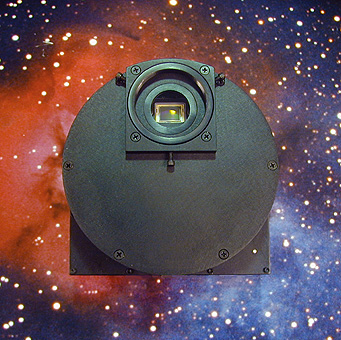 |
However, since the credibility of the management and of the products at SBIG are so well regarded,
we believe it is worthwhile to make this interesting information available to our customers
SBIG's customers have been invaluable sources of inspiration and direction. It was in direct response to customer inquiries that SBIG developed the ST-2000XM. Now those casual imagers who wanted something bigger and better but not at such a high price as the ST-8 or ST-10 CCD systems have got what they asked for. The ST-2000XM has been developed to meet the needs of the astro imager looking for:
- A relatively large CCD with a generous field of view
- Lots of pixels - more than a megapixel
- Good sensitivity
- Low noise
- Antiblooming protection
- High resolution on smaller telescopes
- Flexibility of binning 2x2 on larger scopes with good image size
- Self-guiding
- High speed download
- Professional software
- Easy to use
- Full compliment of optional custom accessories
- Lower price
- SBIG quality and support
A first for SBIG, the new model ST-2000XM (X=high speed USB, M=microlens) uses an high quality interline CCD from Kodak. The KAI-2000M CCD is a 2 megapixel progressive scan detector with an active image area of 1.92 million pixels. The active image area is 1600 x 1200 pixels at 7.4 microns. This array is 75% larger than the Sony CCD used in competitors' "megapixel" cameras and ST-2000XM is a self-guiding camera, utilizing SBIG's patented dual sensor design. The imaging CCD is nearly the same size as the KAF-1602E used in the ST-8XE but due to the smaller pixel size it contains nearly half a million more pixels than the ST-8XE. Full frame download time is approximately 4.5 seconds with our new high speed USB electronics. This camera is also fully compatible with all of our existing SBIG accessories including the CFW-8 filter wheel and the innovative AO-7 adaptive optics device. The ST-2000XM has antiblooming protection, and the quantum efficiency is comparable to the Anti-Blooming Gate enabled (ABG) versions of the new enhanced full frame "E" detectors used in the ST-7XE cameras with a shift in the peak sensitivity toward the blue. Compared to the ABG versions of the full frame "E" series cameras, the ST-2000XM is more sensitive in the blue and green, and slightly less sensitive in the red. Moreover, because the ST-2000XM has two CCDs (a guiding CCD as well as an imaging CCD) in the same camera head, it is capable of self-guiding without any compromise in the quantum efficiency of the imaging CCD. In other words, not only CAN it self-guide, it can do so without having to double the exposure time to compensate for the guiding feature.
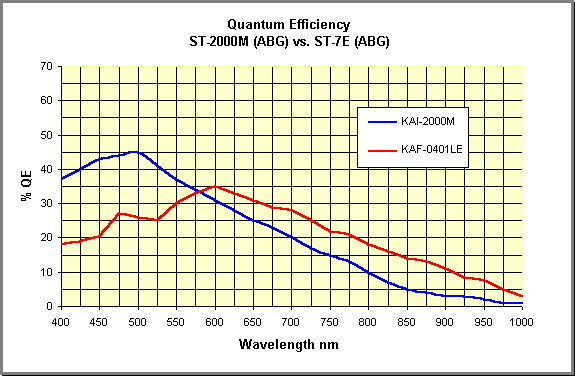 |
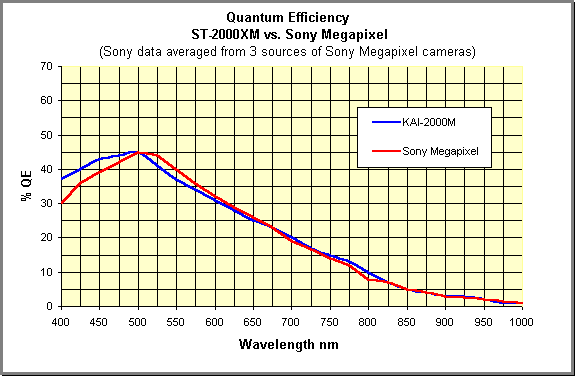 |
The ST-2000XM is equipped with SBIG's new cooling design. This includes a new a heat exchanger ready for water circulation as standard equipment. For the vast majority of applications the water circulation feature will not be needed. This design will typically cool to -35o below ambient (-30o minimum) without water or typically down to -45o C from ambient (-40o minimum) with water circulation. Cooling is also regulated to 0.1 degrees. The ST-2000XM has an electronic shutter and, unlike competing models, a mechanical shutter as well. It can therefore not only take very short exposures for high resolution planetary imaging, it can also automatically take and subtract dark frames without having to cover the telescope or remove the camera.
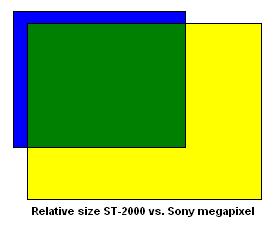 |
2 megapixels 7.4 microns High speed USB 5 second downloads Self-guiding CCD $3495.00 |
|
| What you get with the ST-2000XM | Feature | ST-2000XM |
| Megapixels | High Pixel Count | 2 million (1.92 million image area) |
| Good pixel resolution on small scopes | Small pixels | 7.4 microns |
| Big field of view on small and medium scopes | Large CCD Array | 1648 x 1214 (1600 x 1200 image area) |
| High blue response | QE at 400 nm | 37% |
| Mechanical shutter for dark frames | Auto dark frames | Yes |
| Second CCD included | Self-guiding | Yes |
| Regulated cooling to 0.1 degrees | Reuse Dark Frames | Yes |
| Improved cooling capability | Water cooling available | Included (up to -45C delta) |
| Premium software: CCDSoftV5 and TheSky | Extra Software | Included at no additional cost |
| Fast electronics | High Speed A/D | ~425,000 pixels / sec |
| Fast Full Frame Downloads | High Speed USB | ~4.5 sec |
| Big Bang for your Buck | Introductory Price | $3495.00 |
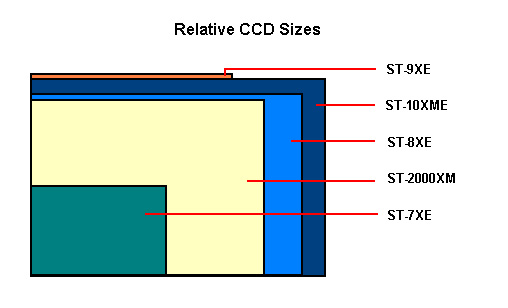 |
The size of the CCD determines the field of view through a given optical system |
The pixel size should be
matched to your optical system for best performance. |
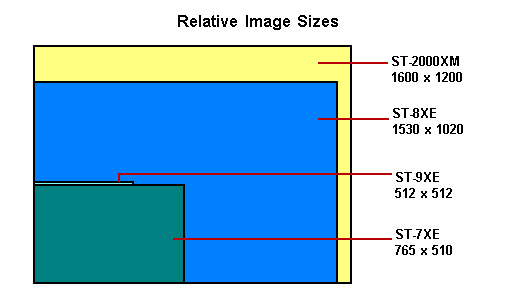 |
The pixel array
determines how large the image size appears on your monitor |
Standard Accessories for the ST-2000XM:
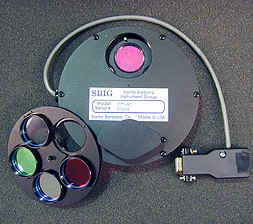 |
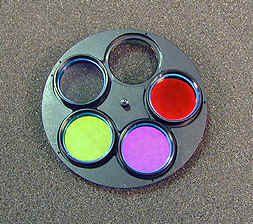 |
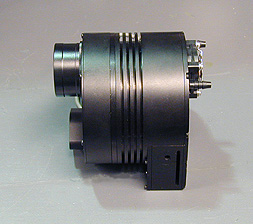 |
| CFW8A Color Filter Wheel
with custom RGB dichroic filters for color imaging |
Extra carousel available
for additional specialty filters or UBVRI sets |
Integrated CFW8A design
mates to camera housing to form single unit |
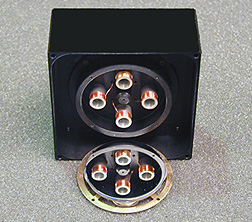 |
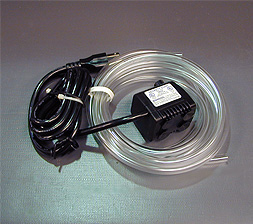 |
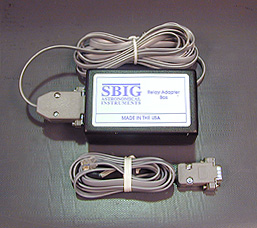 |
AO-7 adaptive optics
accessory uses the |
Optional submersible
water pump and |
Relay Adapter Box uses
signals and power |
ST-2000XM First Light Images:
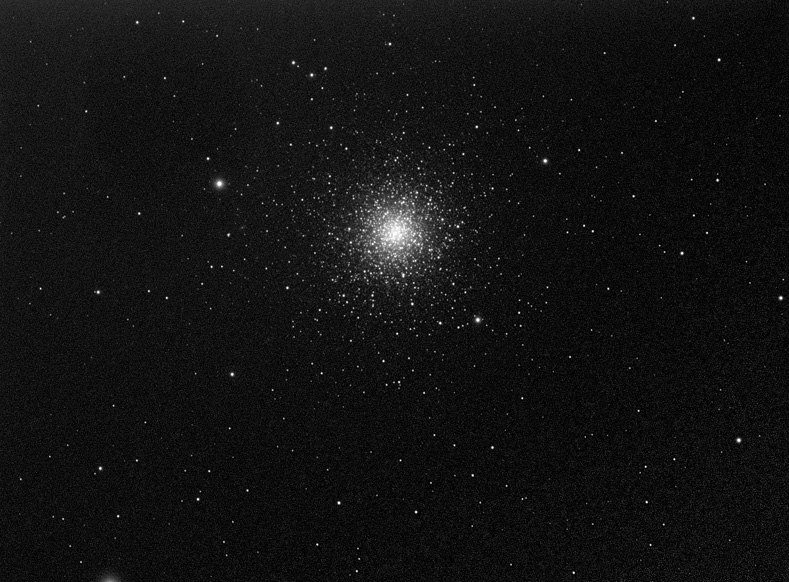 |
M3.
ST-2000XM "First Light" image. |
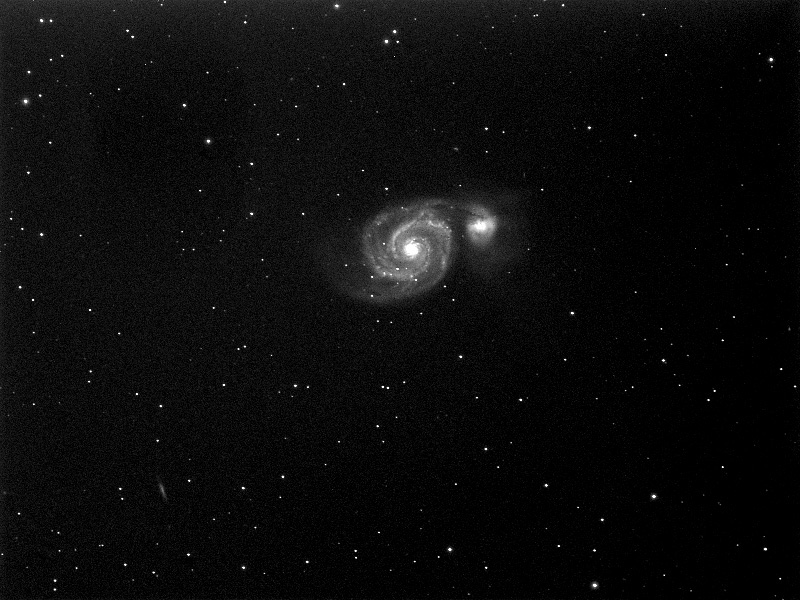 |
M51 and IC4263.
ST-2000XM "First Light" image. |
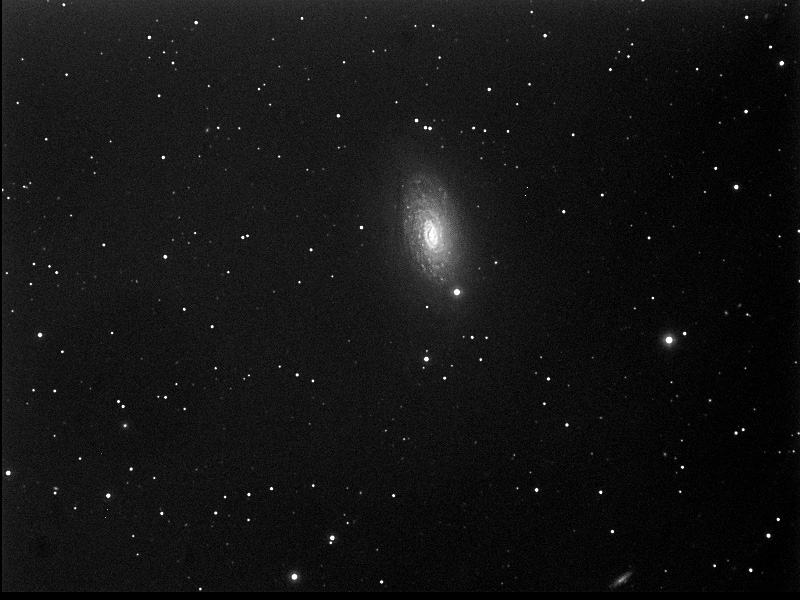 |
M63 and UGC8313 .
ST-2000XM test exposure. |
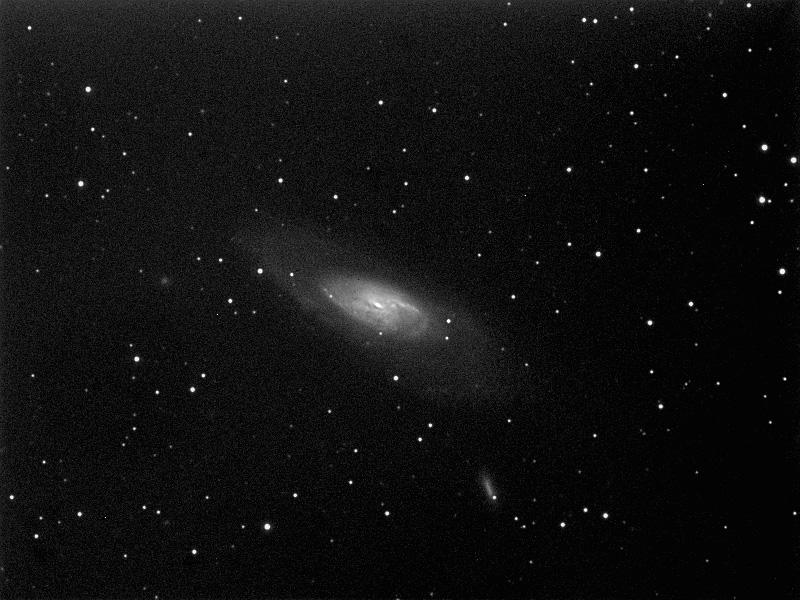 |
M106, NCG4248
and UGC7356. ST-2000XM test exposure. |
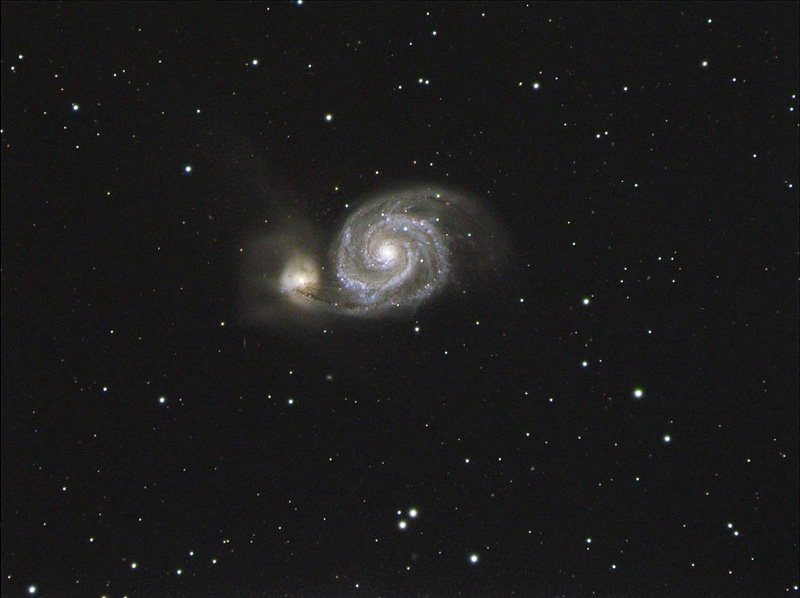 |
M51.
ST-2000XM. |
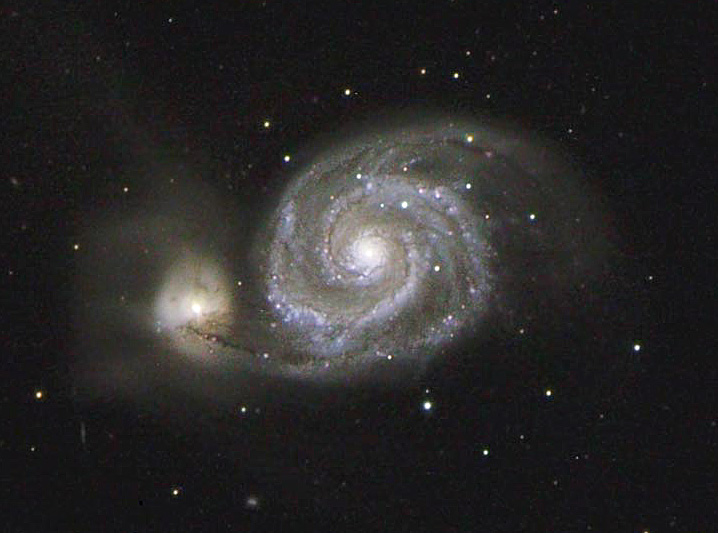 |
M51. Same as above. Cropped central portion at full resolution. |
The ST-2000XM is a complete camera system. There is no need to add in the additional cost of an interface or an autoguider or a nosepiece or better software to make these cameras actually operate as they should. Everything that is needed to make the camera operational is included in the base price. Company Seven and SBIG even include some non-essential, but desirable, items such as a custom hard carrying case and extra nosepiece.
Each ST-2000XM camera system INCLUDES at no additional cost:
- Rugged camera body with imaging and autoguiding CCDs and new analog and digital electronics
- 2 Megapixel KAI-2000M imaging CCD
- Built-in TC-211 CCD autoguider with 10X the sensitivity of an ST-4
- High speed USB interface (up to 421,000 pixels per second)
- New I2C bi-directional expansion port
- Standard accessory / telescope port
- User rechargeable desiccant plug (no need to return the camera to the factory for frosting problems)
- "Dummy" desiccant plug for dust prevention during recharging procedure
- Internal shutter
- 2 Nosepieces (1.25" and 2")
- Cooling Fan - on/off controlled by software
- New heat exchanger design with water cooling capability
- Tripod mount 1/4-20 threaded side plate
- T-thread ring
- 15 foot USB cable (third party USB extenders available for up to 500 meters!)
- Adapter plug for telescope interface cable (for autoguiding)
- Telescope interface cable (for autoguiding)
- Universal 90-240VAC power supply with remote on/off switch
- SBIG's CCDOPS version 5 camera control software
- Software Bisque's CCDSoftV5 camera control and image processing software
- Software Bisque's TheSky version 4, level II
- Operating Manual
- Custom design hard carrying case with pre-cut foam for your camera
SPECIFICATIONS OF THE ST-200XM COMPONENTS:
Model ST-2000XM CCD
| CCD | Kodak KAI-2000M + TI TC-211 |
|---|---|
| Pixel Array | 1600 x 1200 pixels, 11.8 x 8.9 mm |
| Total Pixels | 1.92 million |
| Pixel Size | 7.4 x 7.4 microns |
| Full Well Capacity (Unbinned) | ~45,000 e- |
| Full Well Capacity (Binned) | ~90,000 e- |
| Dark Current | 0.35e¯/pixel/sec at 0° C |
| Antiblooming | Standard |
Readout
| Shutter | Electromechanical |
|---|---|
| Exposure * | 0.01 to 3600 seconds, 10ms resolution |
| Correlated Double Sampling | Yes |
| A/D Converter | 16 bits |
| A/D Gain | Unbinned = 0.72e-/ADU Binned = 1.4 e-/ADU |
| Read Noise | 15e- RMS |
| Binning Modes | 1 x 1, 2 x 2, 3 x 3, and 1 x N, 2 x N, 3 x N |
| Digitization Rate | ~ 425khz |
| Full Frame Acquisition | ~ 4.5 seconds |
* Note: The shortest exposure time with current software drivers is 0.12 sec. Future software updates, available for free from our web site, will reduce this to 0.01 seconds. |
|
Optical (8" f/10)
| Field of View | 20 x 15 arcminutes |
|---|---|
| Pixel Size | 0.75 x 0.75 arcseconds |
| Limiting Magnitude (est.) | Magnitude 14 in 1 second |
| (for 3 arcsec FWHM stars) | Magnitude 18 in 1 minute |
System
| Cooling - standard | Single Stage Thermoelectric, Active Fan
with Water Assist -35 C from Ambient Typical without water -45 C from Ambient Typical with water |
|---|---|
| Temperature Regulation | ±0.1°C |
| Power | 5 VDC at 1.5 amps, ±12 VDC at 0.5 amp desktop power supply included |
| Computer Interface | USB |
| Computer Compatibility | Windows 95/98/2000/Me/NT/XP |
| Guiding | Dual CCD Self-Guiding |
Physical Dimensions
| Optical Head | 5 inches diameter x 3 inches 12.5 cm diameter x 7.5 deep 2 pounds/0.9 Kg |
|---|---|
| CPU | All electronics integrated into Optical Head, No CPU |
| Mounting | T-Thread, 1.25" and 2" nosepieces included |
| Backfocus | 0.92 inches |
Company Seven is now accepting orders.
Go to Price List
Go back to SBIG Products page
Contents Copyright 1994-2002 Company Seven - All Rights Reserved